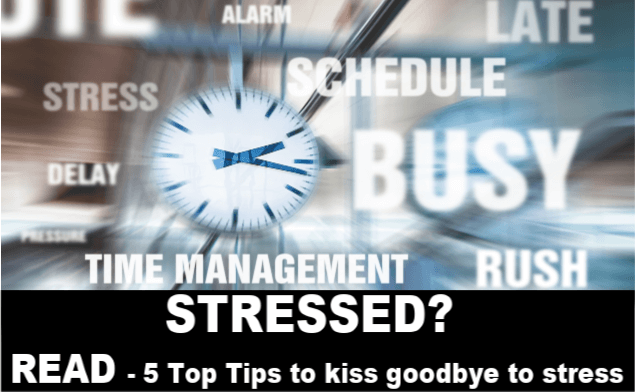Imagine this, the alarm didn’t go off this morning so you slept late! You are stuck in a long winding snake of traffic when your petrol light comes on, your phone is vibrating it’s the boss who wants to know where the client file is for the meeting you should be in right now. Your heart is thumping in your chest and your body feels hot. You can’t think straight. Your bosses face is whizzing around in your mind and you are fairly sure you forgot to lock the front door. A rising panic sits in the pit of your stomach as right there you have no clue what to do.
Ever had a morning like that? (did you feel your stress levels rising just reading that?!)

What is Stress?
Whilst we each experience stress differently, a chain of automatic unconscious reactions kick off when we’re stressed. The body reacts like it’s under attack. The body releases the stress hormones cortisol, adrenaline (and others) to prepare the body for physical action, often shutting down unnecessary functions e.g. the digestive system. Instead, the body sends blood to the necessary organs & muscles (heart, lungs etc) read for the flight or fight response to the perceived threat. The body reacts physically, such as increased sweating (which is a safety mechanism where the body is trying to dispel the excess hormones in the systems), heads get foggy and we can’t think straight, we are more likely to make mistakes, feel light headed …. the list of symptoms goes on and on. Stress can make you feel aggressive and agitated due to the fight nature of the bodies response and this can have an adverse effect on relationships and possibly your reputation. If high levels of stress continue for a long time, there can be long term consequences – e.g. if the blood is often taken away from the digestive system, don’t be surprised if you get IBS!
Are we suffering a stress epidemic?
Stress Awareness Month focuses on increasing public awareness about both the causes and cures for our modern stress epidemic. Now, I’m not sure there is a “cure”. I’m not even sure there should be. We need stress to a point. Contrary to popular belief, some stress is good. It causes us to focus, act or react in for example times of danger. The challenge is managing inappropriate or unwarranted stress, especially when it gets too much. Prolonged stress, where the body doesn’t have time to recover is the challenge in our modern day lives. It can even reduce brain function long term.
Stress is commonplace. It always has been. Life is stressful. Some stress can’t be eliminated. Has it got worse? most probably. The smarter question though is have we kept pace with ensuring people have mechanisms to cope with the increased levels of stress? The answer is absolutely not. The solution to today’s stress is how we equip people with ways to enable the body to recover, develop helpful coping mechanisms and methods to eliminate unhelpful stress from our lives.
So what can I do? Here are 5 Top Stress-Busting Tips
- Prioritise your health – The first step is to notice what your body is telling you. If you notice any stress note what triggered them and when. Give yourself a quick body scan and notice what level your stress levels are at.
- Get a good night’s sleep – allow your body a chance to recuperate
- Practice deep breathing – if you allow yourself to focus on deep breathing It allows your mind to relax a little. You could also check out the Tracing Hand Breathing exercise that’s on my YouTube Channel (click here).
- Stay hydrated – our bodies are 70% water and we need to keep this topped up for excellent brain performance, it maintains our cognitive functions and our eyesight can be affected when we are dehydrated.
- Adopt a resourceful mindset – this is a biggy. A resourceful mindset can make a huge shift in your stress levels. Empowering yourself to say ‘No’ or ‘Not Now’ to the things/people that stress you. Understanding if you have an unhelpful pattern of thinking that always leads you down the slippery slope to stress (for NLP trained people, you need to use a pattern interrupt to stop the pattern running). Are you in an emotionally resourceful state- if not, how can you get back into a feeling that will support you with what’s head (e.g. calm, confident, empowered etc). There are various ways to do this.
Keen to get under the skin of stress and change things for good?
Here at Unleash Your Potential we utilise the NLP toolkit to help manage and maintain lower stress levels. We teach on our NLP Practitioner course how to recognise stress and the negative effects it has on their or their client’s bodies. We teach resourceful mindset strategies. We encourage the release of negative emotions on our Time Line Therapy™ training and also teach hypnosis which can offer excellent relaxation, which is a great stress reliever.
If you can’t get to us in the training room or would prefer to learn in the comfort of your own home, why not take a look at our online course “Manage your mind, Practical Techniques to better stress and pressure”. For the cost of a takeaway, you get immediate access and the ability to revisit as many time as you like! You will gain a better understanding of how the mind works under stress and recognise the early signs to you can take empowered action, early. You’ll also learn how your mind, body and emotions are connected and impact how you feel. Stress is after all simply a feeling and feelings can be changed! You’ll get a ton of practical tips and ways to better manage your stress.
**FREE BONUS**– AFTER MORE FREE TIPS?!
Would you like access to our free video training series which includes 5 more practical tips to manage stress and handle pressure, delivered by Laura herself? Sign up to our free newsletter that is packed with great tips and advice here and receive your free training – click here to get immediate access!


